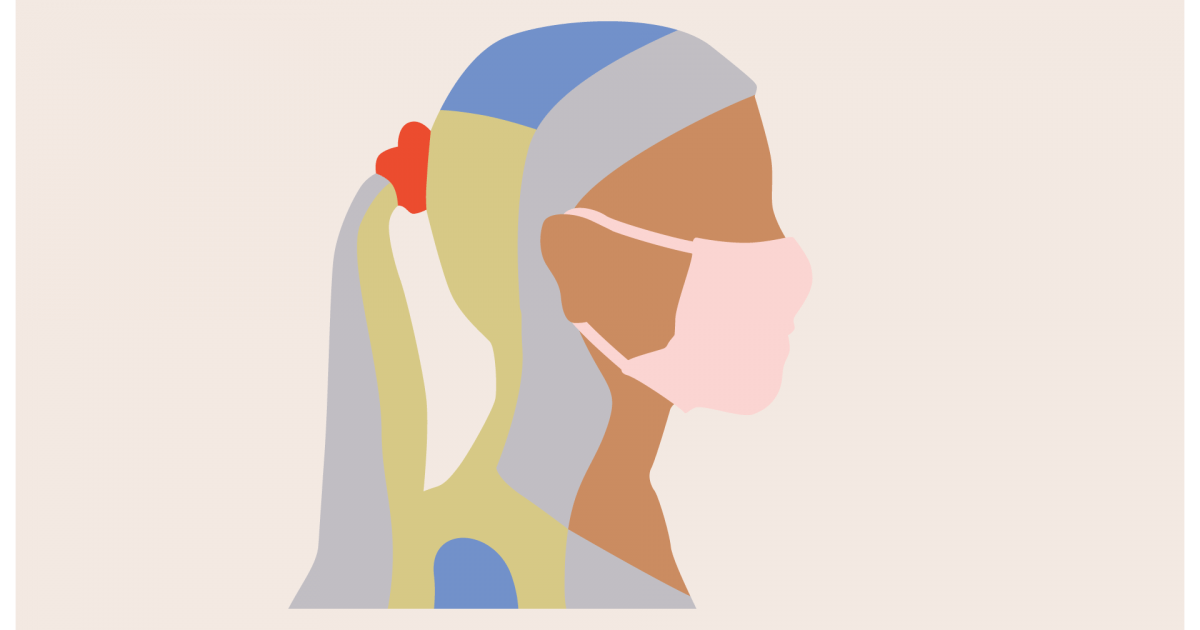"It's a nightmare that won't ever end."
Reggie had a problem.
Read MoreOfficials in multiple states justified this stance by saying it should be up to the parents to decide whether a child should have to wear a mask. That left Reggie and other parents of children who have been diagnosed or survived pediatric cancer with few options, and none of them great.
Reggie had concerns during the first three waves of the COVID pandemic, but nothing like the concerns brought on by the delta variant.
Now he was reading about children being hospitalized, children being put on ventilators, and the immunocompromised being at a greater risk of contracting the virus – even if they had received a vaccination.
That is how he found himself just days before the first day of school coming up with ideas for five face masks, each individually designed so that his son would never want to take them off even if no one else in class was wearing one.
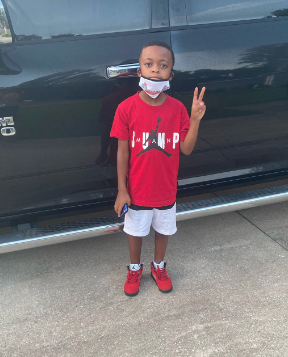
"Getting ready for school we got him a new mask for each day," explains Reggie.
Each mask bears his son's name along with some of his favorite games: Fortnite, Roblox, Minecraft, Among Us, and Bakugan.
"Each day we will put on a new N95 filter, and he will have some hospital grade masks in his bag as well," says Reggie.
The Roblox mask has proven to be the early favorite, and was worn on the first and second day of school this week.
And as his son departed for that first day of school with his sister, a junior in high school who will also wear a mask, Reggie had just one thought: "God protect my babies as they embark on another year of school."
For parents like Reggie, masks and the strength of God are the best solution when a child is too young to be vaccinated and too vulnerable to risk going maskless in a crowded classroom.
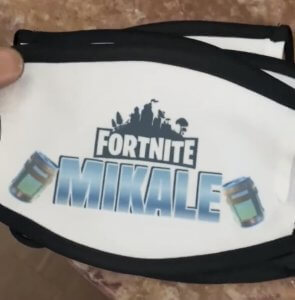
Relying on Virtual Learning
For Brooke, a mother who lives in the Naples area and has three children under the age of 12, the solution is virtual learning.
Her children will all be doing virtual learning this year, despite her strong desire to see them back in the classroom and socializing with other children their own age.
That is not because the children are immunosuppressed though, but rather because one of the members of the household has cancer. Brooke fears that one of the children might contract the delta variant while at school and spread the virus throughout the household.
"It is not ideal," says Brooke. "They would be starting off the year doing virtual learning even if masks were required in a school. There is a surging variant that we know nothing about. Hospitals are packed with patients. And unvaccinated and vaccinated seem to be spreading the virus everywhere they go."
Brooke explains that she cannot control those things, or the fact that he children cannot get vaccinated, so she is opting instead to "cut off the world," and control what little she can in this situation.
"My goal from now until this virus goes away is making sure the thing that is outside my house does not make its way inside my house," says Brooke.
"I simply do not trust sending my children out into the world at this moment."
Teaching After Chemo
In Texas one teacher put everything on the line by trying to get her district’s school board to defy the state’s orders.
Caroline Sweet is a teacher for the Austin Independent School District. She is also battling cancer, and despite just completing her chemotherapy a few months ago is planning to be there for the start of the school year.
Her remarks were brief and succinct, as she told the board:
“For many years you’ve asked me to be brave. You’ve asked me to be brave as I practice getting 24 fourth graders into a bathroom. You’ve asked me to locate in our hiding spot anything with which I might fight off an active shooter. You’ve asked me to be brave, as I think about what would happen if there was some sort of extreme danger, and my class was on the playground. I’ve discussed with kids, how we would run into the woods hide by the creek all of us together avoiding danger. You asked me to be brave and come back to work during a pandemic after surgery and six months of chemotherapy for stage three cancer, and I’ve done it, and I will do it, and I will show up and I will get in my closet and I will look for the path to the woods. Board members, you don’t have to do these things, but just as I will be brave and think about how my body might shield children from danger. I asked that you be brave today. You know what you need to do to protect children, to implement a district wide mask and vaccine requirements for students and staff.”
Later that night, the board voted to defy state officials and mandate masks for all students.
A number of the largest school districts in both Texas and Florida are now doing the same thing, as well as schools in cities including Dallas, Houston, Miami, Orlando, Tallahassee, San Antonio, Palm Beach, and Fort Lauderdale.
Life or Death
There are also some parents who have not yet given much thought to how their immunosuppressed child will attend school this year because that child is fighting for their life after being hospitalized with COVID.
This is the case with Mirsada.
Doctors discovered her 9-year-old daughter, Blair, had a brain tumor earlier this year, which they were able to remove with surgery.
She had been slowly recovering from that operation when she contracted COVID in late July.
That COVID then led to pneumonia which forced doctors to put the girl on a ventilator.
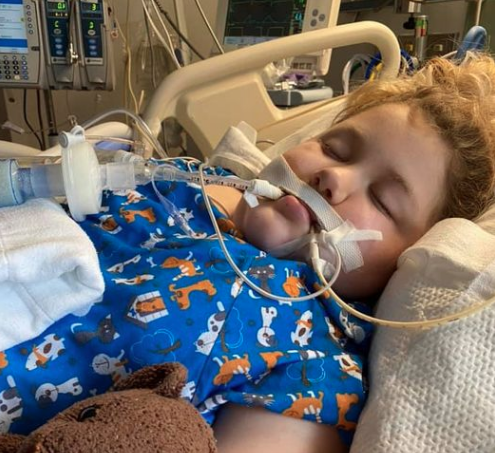
“Look at my child! This is why people are afraid. This is why people beg for you to wear a mask. Who are you hurting by wearing one? What freaking rights are you losing?! Because, while I sit here and watch a machine breath for my baby, you are out living. I can't visit with my other child because I am here,” says Mirsda, who also has a 5-year-old daughter.
“This is the harm you cause because you couldn't bring yourself to wear a freaking mask.”
In the days since Mirsada first spoke to SurvivorNet there has been some positive changes, starting with Blair being taken off a ventilator.
She still had a feeding tube, though, as she could not remember how to swallow, was having hallucinations, and was slowly being weened off the fentanyl that was used to minimize her pain.
But she is still “the same sweet girl,” says Mirsada. “She is hungry, she is bored, she is sassy.”
On Monday, the feeding tube finally came out and she is now walking with some assistance.
“She's ready to come home and I'm ready to get her here. Not sure on a discharge date, because she is still weaning from the sedation with methadone and that's a slow and steady process,” notes Mirsada. “So far though, she is pushing through and making leaps and bounds.”
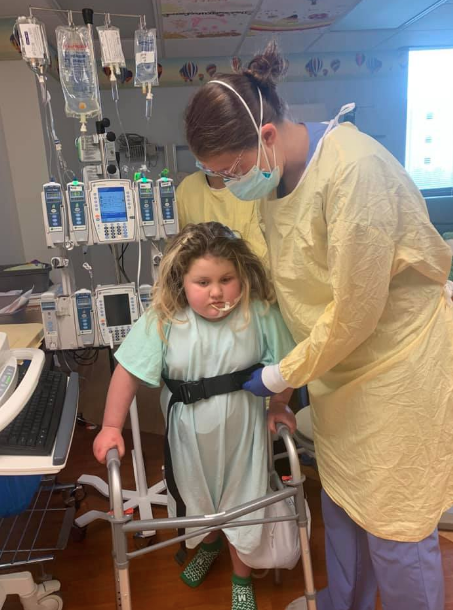
Blair has defied all the odds in recovering from a brain tumor, COVID, and now near-fatal pneumonia.
She will now have to risk her life again every day should she want to get an education in Knox County, Tennessee where the family lives as virtual learning is not offered for students and masks are not mandated in schools.
When asked for what guidance the state had for children like Blair, the Tennessee Department of Health told Survivor Net: “We encourage anyone who is eligible to receive a COVID-19 vaccine to get one now. Getting vaccinated can also protect people around you, particularly people at an increased risk for severe illness from COVID-19 as well as those not eligible for the vaccine.”
The Florida Department of Health and Centers for Disease Control did not respond to requests for comment.
How to Protect Children With Cancer
The American Cancer Society offered a handful of alternatives for parents whose children are battling cancer, including:
Homebound instruction
The school district might arrange for a teacher to work with your child at home if they have to be out of school for longer periods of time, but are not in the hospital. Some children with cancer might go to school during some parts of treatment and then receive homebound instruction or hospital instruction during other parts of their treatment.
Attending a hospital or clinic-based school
When a child will have to be in the hospital for a long time, they might be able to have teachers from their school district or from the hospital school come and teach. In-hospital schooling can also work well for children who do not feel well enough to have more than one hour of instruction a day. Even one hour of school a day can still give the children the feeling of connection to what children without cancer do every day.
A 504 plan or Individualized Education Plan (IEP)
These may be part of how the school, your cancer care team, and your family work together to help your child participate in school during their treatment and after. The teacher that works for the hospital or the social worker on the cancer care team can help you understand how these services work for children with cancer.
Learn more about SurvivorNet's rigorous medical review process.

